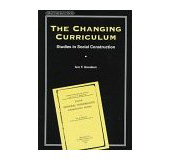The Changing Curriculum: studies in social construction
Chariots of Fire
Hence coherent alternative forms of education and curriculum developed in a wide range of schools for all classes prior to the Industrial Revolution and even after industrial transformation were retained in the public schools for the 'better classes' (and indeed for the working class were retained and defended in pockets such as 'adult education'). The model of curriculum and epistemology associated with State schooling progressively colonised all educational milieu and established itself some time in the late 19th Century as the dominant pattern. The subsequent linking of this epistemology to the distribution of resources and the associated attribution of status and careers stands at the centre of the consolidation of this pattern. The assumption that the curriculum should be primarily academic and associated with university disciplines has been painstakingly worked for and paid for. We should beware of any accounts that present such a situation of 'normal' or 'given'.
At root such a hierarchical system is often seen as denying the dialectic of education, the notion of dialogue and flexibility which some viewed (and view) as central to the way we learn. If 'subject matter is in large measure defined by the judgements and practice of the specialist scholars' and 'students are initiated into a tradition' their attitudes approach passivity and 'resignation' this mutuality is deliberately denied. The rhetoric of the 'discipline' and the academic subject might therefore be seen as characterising a particular mode of social relations.
Educationists concerned with establishing a more egalitarian practice and curriculum are driven to constantly assert the need for dialogue and mutuality and with it to argue for 'reconstruction of knowledge and curriculum'. For if the opinions cited are right the very fabric and form of curriculum (as well as the content) assumes and establishes a particular mode of social relations and social hierarchy. Seen in this way to argue only for changing the teaching method or the school organisation is to accept a central mystification of hierarchical structure through curriculum which would actively contradict other aspirations and ideals. Hence where pockets of alternative practice exist they present a similar case for egalitarian practice: in liberal adult education the following argument is presented:
All education which is worth the name involves a relationship of mutuality, a dialectic: and no worthwhile educationalist conceives of his material as a class of inert recipients of instruction - and no class is likely to stay the course with him - if he is under the misapprehension that the role of the class is passive. What is different about the adult student is the experience that he brings to the relationship. This experience modifies, sometimes subtly, and sometimes more radically, the entire educational process: it influences teaching methods, the selection and maturation of tutors, the syllabus: it may even disclose weak places or vacancies in received academic disciplines and lead on to the elaboration of new areas of study (Thompson 1968, p.9).
